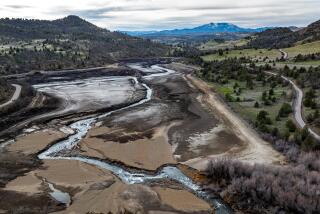Settling a Tangled Dispute
- Share via
The good intentions of government officials back in 1891 have led to a hopelessly entangled legal and bureaucratic dispute between Hoopa and Yurok Indians in Northern California. The courts have failed to resolve the issue fairly during the past quarter-century. Now the best solution is to be found in pending congressional legislation sponsored at some peril to his political life by Rep. Douglas H. Bosco (D-Occidental).
Not all Yuroks like the Bosco bill, but it seems to be the most equitable course of action and, if nothing else, respects tribal traditions and provides a fair monetary settlement for the Yuroks. Some individual Yuroks and Hoopa officials have negotiated a compromise, and the Bosco bill has won the support of the House Interior Committee. It deserves approval of the full House and Senate and the President’s signature.
The tangled tale is far too complicated to relate in detail here, but the story revolves around the rich timber resources of the tribal lands along the Klamath River northeast of Eureka in Humboldt County. Before 1891 each group had its own separate reservation, but they were joined by Congress and the Department of the Interior in a bit of a bureaucratic quirk with the goal of safeguarding the legal integrity of the reservation boundaries.
An important part of the story involves the social history of the two tribes over the years. The 4,000-member Hoopa remained a contained self-governing reservation tribe, living on its original 12-mile-square territory and sharing the tribe’s resources communally. In contrast, the Yuroks did not have an organized tribal government. Many Yuroks sold their individual land allotments, left the region and became assimilated into the general society. The two reservations remained tied to each other geographically and legally, but the tribes pretty much went their separate ways.
The modern legal battle began after the Interior Department started distributing timber-sale profits to the Hoopa tribe in the 1950s. Individual Yuroks sued, claiming a share of the timber sales. The claims were upheld in court, on exceedingly narrow and illogical grounds, but the award was delayed as hundreds of other plaintiffs flooded the court in search of their own shares. Further, a federal court this spring stripped the Hoopa Valley Tribe Business Council of authority to govern the tribe, and placed the U.S. Bureau of Indian Affairs in control of the reservation and profits from timber sales. By now more than 3,800 Yuroks or persons claiming Yurok ancestry are seeking shares of the millions in timber receipts that have built up in a federal escrow account over the years.
Bosco’s bill is quite simple. It would divide the reservation into two, as it was before 1891, and restore control of the Hoopa territory to the Hoopa tribal government. It would provide a $22-million trust fund for the creation of a Yurok tribal organization and distribute $65 million toward the settlement of Yurok claims, tax free. Any money then remaining in the escrow account would be shared equally by the tribes. Fair enough.
More to Read
Sign up for Essential California
The most important California stories and recommendations in your inbox every morning.
You may occasionally receive promotional content from the Los Angeles Times.













